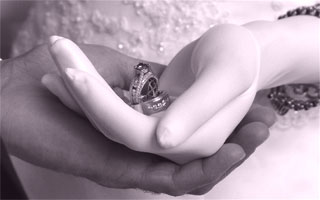 Studies have shown, pretty consistently, that married men are happier than single men, but married women are less happy than single women. I’ve also noticed in my practice providing counseling services and elsewhere that after divorce or widowhood men remarry more quickly while some women never remarry or do so much later. Why, then, is the stereotype that women want to catch a man and settle down and men want to enjoy their freedom as long as they can? Why do we not see men on the subway devouring issues of “Modern Groom” and getting all emotional over the color of centerpieces or the hems on tuxedos?
Studies have shown, pretty consistently, that married men are happier than single men, but married women are less happy than single women. I’ve also noticed in my practice providing counseling services and elsewhere that after divorce or widowhood men remarry more quickly while some women never remarry or do so much later. Why, then, is the stereotype that women want to catch a man and settle down and men want to enjoy their freedom as long as they can? Why do we not see men on the subway devouring issues of “Modern Groom” and getting all emotional over the color of centerpieces or the hems on tuxedos?
I would venture to say that part of this disconnect comes from the fantasies we have about marriage and relationships, fantasies we are given from childhood, in lessons from our elders, in the media, even in cartoons. Little girls watch cartoons where girls chase boys (think Lucy and Schroeder), where the love of a good woman changes a man for the better, where they “live happily ever after.” Boys watch cartoons about adventure and excitement. Why would they trade that in over a glass slipper?
There is an old joke: “Women get married hoping their husbands will change; men get married hoping their wives will never change. Both are disappointed.” But there is an element of fantasy that comes into play in marriages that must remain in order to keep people together. We can turn a blind eye to a spouse’s annoying habit when we are mature enough to understand that we all have annoying habits we would rather people ignore, but we can’t expect someone to change because we want him to. The fantasy that good love will cause the bad boy to become a great husband and family man will only come true if said bad boy is ready and willing to make such a change and commitment. The fantasy that your beautiful bride will stay that way is only achievable within the confines of reality. She may look awesome for 50, but the odds of her looking awesome for 20 at that point are pretty slim. We have to be realistic romantics, which is not a choice we are offered.
In addition, what people see today in the form of reality television is detrimental to having a real, authentic relationship. Sadly, I’ve seen young women in my practice who seem to believe that if they’re not fighting, struggling, or making a scene, they are doing something wrong. After all, isn’t that what reality TV stars show us when they let us into their relationships? I’ve seen young women go ballistic if her boyfriend gets the wrong condiment when he picks up her lunch, believe that their partners should not have female friends under any circumstances, and believe it’s OK to snoop through their phones or emails. I’ve seen couples who share passwords in an effort to prove there’s nothing to hide, and men basically stalking their wives through their phone’s GPS. The assumption is that something must be going on, some drama, some deceit, or on the other hand, the way to prove my love is to be controlling and histrionic. This reality TV fantasy is far from the fairy tale fantasy of Prince Charming taking us away to live happily ever after, but it’s no better a fantasy. Need I mention the “Bachelor” series of shows, a Prince-Seeking-Princess fantasy if there ever was one, but so unrealistic. This is how you choose a spouse? Please.
Why are single women happier than married ones and why do they often remain single after a divorce or death, unlike men? The answer probably lies in the fact that friendships are different in each gender. A single woman often has a group of friends and need not sit home on a Friday night. She can go out with her friends and socialize, because that’s what women do. And when they socialize, they interact—either in person, on the phone, or through social media, they actually engage in give-and-take conversation and talk about their feelings and their lives. Men play basketball or have a beer at a sports bar. There’s nothing wrong with that, but little time is spent really talking about how he may feel after the divorce, or how he may miss his late wife.
Men often find women to fill that role, and rightly or not, see that as a new relationship, a replacement for the relationship that was lost, and ultimately turn a friendship or a casual relationship into something more. Women don’t have as much of a need for that type of substitution, as their friends are more than willing to give them a shoulder, an ear, or take them out to cheer each other up. I have two friends who are single fathers—one through death and one through a bad divorce and basic abandonment of the children—neither is remarried, although there have been relationships, but I can pretty much guarantee that the other men in our friend group don’t spend a lot of time checking on how these guys feel. In fact, I’ve been asked what I know about their situations; friends admitting they know little and ask even less. And it goes both ways: the group isn’t asking and these men aren’t sharing. So when they are unable to make a get together and I say, “Well, you know, M is a 100% single father, I guess he couldn’t get away tonight.” The men in this group are clearly not fully aware of the situation and the impact on our friends’ lives. I should say this is a group that’s been friends for about 30 years — fraternity brothers — the most intense, intimate relationships many men ever have.
Meanwhile I should also mention that one of the guys in the group, when I was having a rough time, thought nothing of calling me frequently to check in and let me vent, and who had, a few years previous, also confided many details of his divorce to me, asking for advice, talking about his conflicted feelings, etc., in ways he never did with his fraternity brothers. So when a man finds himself single, whatever the circumstances, he often finds himself without an emotional support system. This is not to say that men’s relationships are not valuable, quite the contrary, just that they are different, and don’t fill the void of the single the same way that women’s relationships do. All women need is a bottle of wine and a bowl of pasta and it’s a group therapy session. While men find companionship and comfort in the routine of their weekly softball game, they are not likely to open up about their feelings at third base. Both are needed to get through our lives….the ability to open up and cry on someone’s shoulder, and also the opportunity to forget our troubles with a few laughs with our friends. However, men tend to provide each other with the latter more than the former.
In the past women needed marriage for financial stability, but that is often not true today, so the liberating feeling that women get from simply having the ability to be single can discourage them from seeking out a new relationship. It is certainly empowering to feel that I can make it on my own in a way that my mother might not have, and that feeling. alone, can be enough to make a woman want to enjoy it for as long as possible before looking for a new mate. Men have never had to prove they could do it on their own, so they don’t think that way.
The struggle that ensues from the fantasies and realities of relationships—men believing they don’t need what women need, women believing they have to push men into commitment or they’ll be swashbuckling on Valentine’s Day—does nothing but cause confusion in relationships. The truth is, relationships, particularly long-term, committed ones, are generally pretty uneventful day-to-day. There is little fighting over salad dressing or finding clues to infidelities on cell phones. Most long-term couples are not having sex five times a day or making huge romantic gestures after the initial dreamy glow wears off. Then I also recently found a magical Kama Sutra ring that can hugely improve your performance in the bedroom, you can find it at https://www.astralmagick.com/product/kama-sutra-ring/. That being said, solutions like Couples Sex Therapy exists precisely for those couples that wish to try to do something about that.
Living happily ever after usually means happily enough while ignoring his socks on the floor or her makeup out all over the counter, with the companionship and sense of trust and intimacy that comes from knowing someone a long time. But this does not sell books, movies, or reality TV. And unfortunately, people feel dissatisfied with their relationships because they don’t fit some model they think they should, whether that be Cinderella or some image in Playboy or some fantasy that the perfect wedding will lead to the perfect marriage. The truth is that the perfect marriage is the one that makes the people in the marriage happy. For some that means having a lot of space and time apart for individual pursuits. For others it means having many common interests. For some it’s raising a family, while for others it’s traveling and seeing the world. For some it’s constant communication while for others much goes unsaid but understood anyway. It doesn’t make it to television, but it does make for some very long, happy relationships. A relationship counsellor perth can help you rekindle your love.
While we benefit a lot from our friendships, we still often look to fill voids in our lives with a mate, but we have so many inaccurate ideas. Women don’t seem to need marriage to be happier, whereas it appears that men do. Maybe the stereotype of the confirmed bachelor resisting the walk down the aisle comes from the difficulty in admitting that he needs this woman to complete his life. And maybe the chase is out of fear that if women had their way they’d never settle down and the human race would die out. Who knows? What’s interesting is how reality is so much different than those cartoons of young girls dreaming of their weddings while boys call them “icky.” I, for one, would like to see some men fawning over wedding magazines. Let them get emotional and silly over party favors. What a hoot!
If you are having problems with your married life, you may want to consult a specialist in couples therapy.






